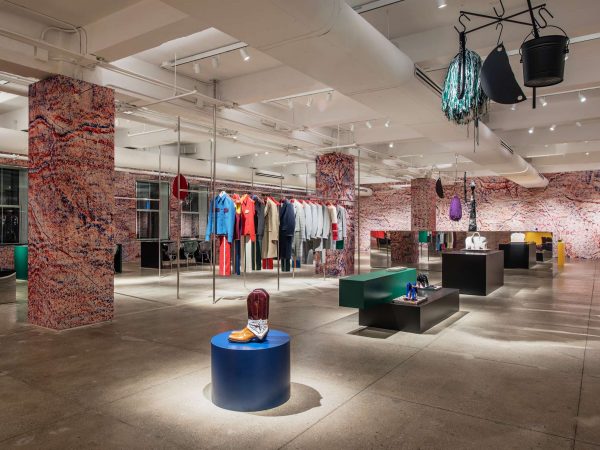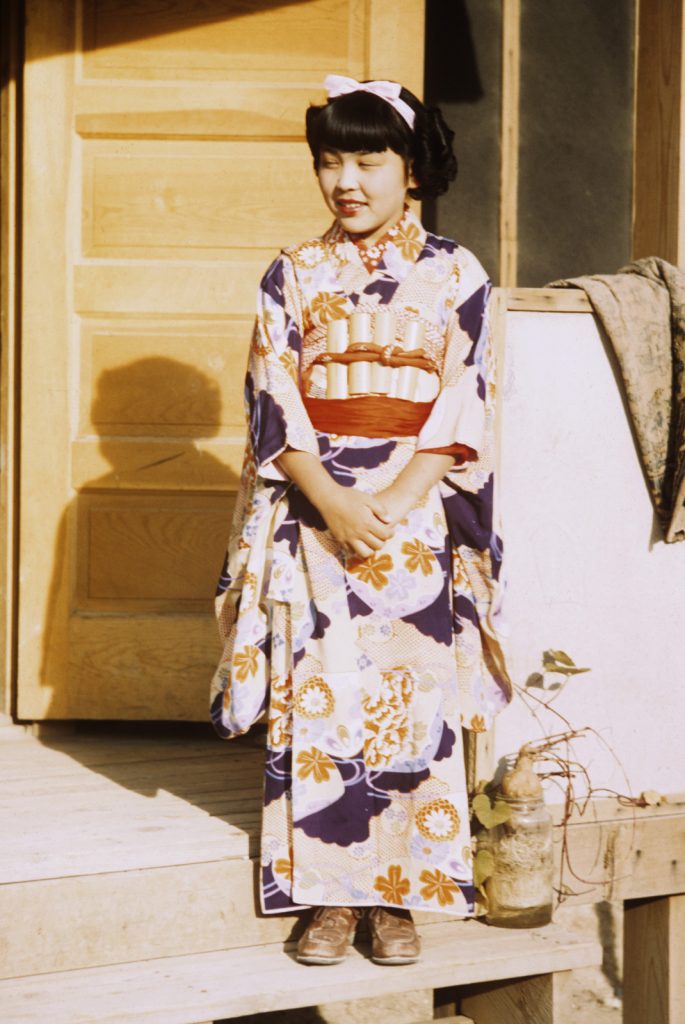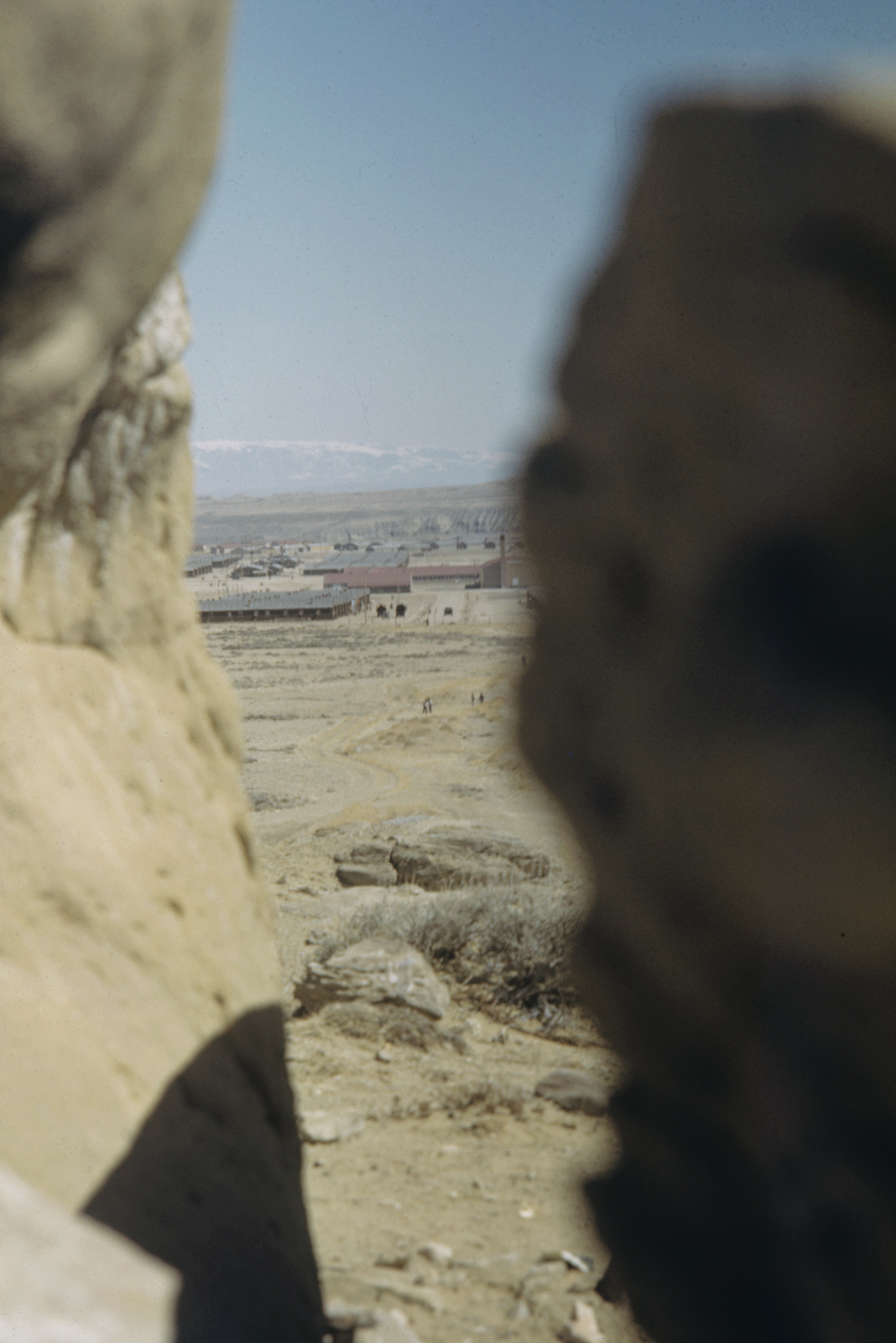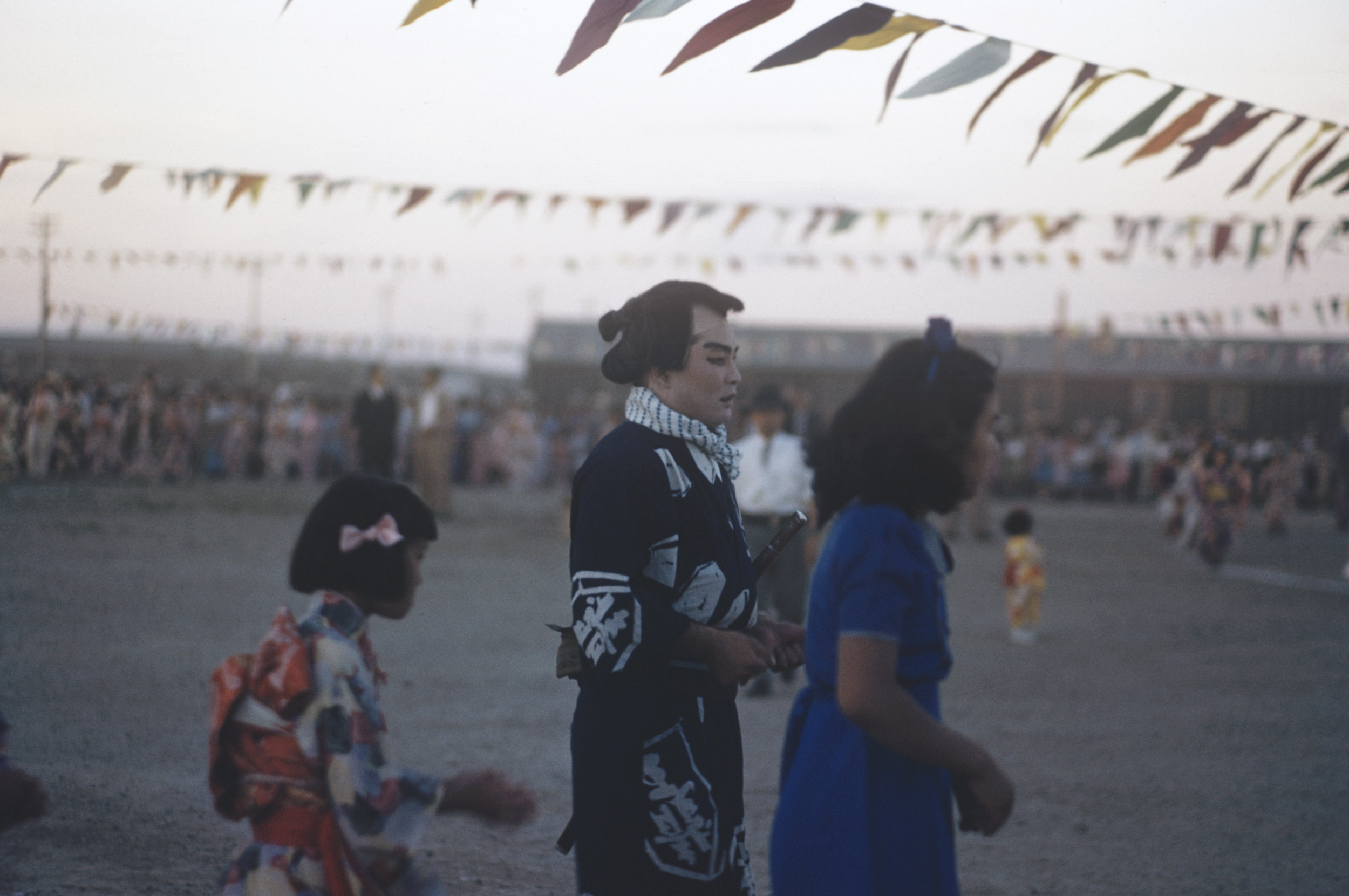In February 19, 1942—ten weeks after Japan attacked Pearl Harbor on December 7, 1941—President Franklin D. Roosevelt signed Executive Order 9066, which initiated the interment of approximately 120,000 men, women, and children of Japanese ancestry for fear that they were spying on the United States. That would eventually go unfounded; not a single case of espionage was proved, and finally, four decades later, President Ronald Reagan signed the Civil Liberties Act of 1988, which apologized to the Japanese community and granted reparations to those who were interned.
Bill Manbo and his family were forced to leave their home on April 28, 1942, following an order to report to the Santa Anita Assembly Center in Arcadia, California. From there, the family was sent to Heart Mountain Relocation Center in Park County, Wyoming. With his 35mm Zeiss Contax camera in hand, Manbo documented life inside Heart Mountain, later sending the film to Los Angeles to be processed. A selection of the photographs were published in the book “Colors of Confinement” in 2012.
Bill Shishima, Helen Yasuda, Madeleine Sugimoto, and Mas Yamashita were all children when their families were forced to enter the internment camps during World War II. Their parents shielded them from the truth, creating a deceptively happy environment that, while confined behind barbed wire, allowed them to do the things that children normally do—attend school, participate in the Boy Scouts, and play outside. Manbo’s photographs, never before seen until now, along with these four American-born internment camp survivors’s accounts, cobble together an often overlooked part of American history.
Bill Shishima, 86, lives in Monterey Park, California. He was 11 years old in downtown Los Angeles when Japan attacked Pearl Harbor.
We had to adhere to Exclusion Order 33, which was dated May 3, 1942, and had to report to the local church on May 9, 1942. We had officially one week’s notice to pack up and move out. I had a pet canary, but my dad said, “No, we can’t take that.” I felt bad. I said, “That’s my pet.” But I couldn’t bring it with me.
It was chaos [at the church], no one knew what was happening. I was sort of excited, not scared. I said, “Wow, we’re going to travel somewhere!” We boarded buses to Arcadia, about 20 miles away from Los Angeles.
There were lots of barracks. We lived in a house on the Santa Anita racetrack, and my grandmother lived in the horse stables. As much as I loved my grandmother, I didn’t care to go visit them because they smelled so bad. There was a barbed-wire fence and armed guards surrounding it. We had school in the grandstand, and I joined the Cub Scouts. I knew that we were so-called Japanese. I thought I was American too, but I found out I wasn’t. I thought I was American the whole time.
Above The Fold

New Perspectives on an American Classic

Introducing: Marine Serre, 2017 LVMH Prize Finalist

Inspiration & Progress

Paskal’s Theory of Design
My dad worked, my mom did not. We were fed three meals a day, so we just had to line up and wait to be served at our mess hall. I wasn’t too choosy about food so it didn’t bother me, but some of my friends didn’t like it. We were just behind a barbed-wire fence with some guards. There was no mistreatment that I know of other than our [lack of] freedom.
The war ended in August of 1945, so my dad went back to Los Angeles to look for a place. He couldn’t find one, but still he called me and my brother out because he wanted to make sure that we went to school in September of 1945. So we came out in August. There was no place for us to live.
My brother went into the Silverlake area as a schoolboy. He lived in a Caucasian’s house, and, to earn his keep, he had to do household chores like wash dishes, mow the lawn, and help around the house. I went to a rabbit farm, and I had to feed the rabbits, change their water, and clean their droppings before and after school.
I finished Los Angeles City College, and I got my draft notice to go to Korea. I was in the service for two years, and when I came back I went to the University of Southern California. I was American, but I wasn’t treated as one. I was classified as an enemy alien.
President Reagan said that it was the worst mistake the United States ever made. It was a little bit too late. I’d hoped my dad would get it, he was the one who suffered most. When he came out of the camp, he was 50 years old and he had five children. He had to start all over again. He was bitter against America. I wish he got it, but he was long gone. He never talked about camp life. I guess he felt that, because he was Japanese, it was his fault.
Trump should learn that it was a mistake. He shouldn’t incarcerate the Muslims or keep them out of America just for religious reasons. He can’t say that all the Muslims are good or bad. Roosevelt said all the Japanese were potential spies or saboteurs, but it was proven that there were no Japanese accused of spying or being espionages during World War II. It was a big mistake.
Helen Yasuda, 84, lives in Monterey Park, California. She was living in Fresno when, at 10, her family was ordered to leave their home.
When you’re a child, the most important things to you are your pets, right? That’s what I remember: leaving my dog behind, leaving my cat behind. It wasn’t what I packed. That was the hardest thing.
We went to the Fresno Assembly Center, and then we went to Jerome [Relocation Center] by train. The blinds were pulled down. You’re packed in like sardines. Occasionally you were allowed to get out to stretch your legs. That’s a long train ride; remember, trains were slow-moving in those days. Once you get to camp, you go to the barracks. All of you live in one room. My mother was wise enough that she pulled some wires across and made partitions with sheets. Your privacy is all gone. You had no kitchen, no bathroom. Everyone in the block—there were about 12 barracks put together—shared a communal latrine. The ladies were lucky, we had partitions, but there were no front doors. Your dignity goes down the drain. Your freedom of movement or whatever you want to keep for your own—your space is gone.
Anyone who wanted to work could work for $16 to $19 a month. We had schools from kindergarten to high school and had after-school activities. Aside from that, you had to go to the mess hall to eat. You just ate what was served. There weren’t nice dining tables with tablecloths, they were picnic tables. In a way, it was the breakdown of family. Because, as kids, who are you going to eat with? You’re going to eat with your friends as long as you have your meal ticket.
You could leave the camp as long as you did not come back to the West Coast. My mother felt that camp life was not the way to raise children, and we had some relatives in Utah, so we requested to leave. My grandfather got sick and it being the time of war, my mother was worried. We returned to camp.
As I got older, I thought, “One day we’re considered an enemy, we’re behind barbed wires.” In Utah, being a new kid that transferred into grammar school, they asked me to raise the American flag and I said, “Here I’m an American.” That struck me as odd. Isn’t it strange? Depending on where you are, you’re viewed differently. When I first started elementary school, I used Chizuko, my Japanese name, and when I came back I changed it to Helen. Most of us all did go to school with our Japanese names and when we came out of camp we switched over to our English names.
We went back to the same place we came from, and worked twice as hard. My parents never discussed camp after we got out because we were too busy trying to make a living. What they did was give you a one-way ticket to go back to wherever you wanted to go in the continental U.S. and $25 a piece to start life over. That doesn’t give you much of a head start, especially if you have a family to feed. We were truck farmers, so we worked on the farm before we went to school, and we came straight back from school and worked.
There was no need for this incarceration except for, I guess, fear. It was discrimination; we had no political party behind us, we had no political person behind us. Were you aware that President Reagan hesitated even before signing [the Civil Liberties Act] until someone jogged his memory and said, “Remember during World War II, you took a folded flag to the Nisei couple and told them, ‘Under our skin, our blood is all the same color.’” I think that, in this day and age, making a list is not an answer to anything. You do not judge a whole group of people by what they look like or their religion. We looked different, they could spot us. It was economics, discrimination, no political backing. That’s what happened to us; we got shuffled underneath the rug and put away.
Madeleine Sugimoto, 80, was six when she was forced to leave her family’s home in Central California. She now lives in New York’s Upper West Side.
My mother, father, and I lived with my mother’s parents in the San Joaquin Valley in Hanford, Calif., which is 30 miles south of Fresno.
My father, who was born in Japan and came to the United States, was teaching Japanese language school on the weekends, but he was an artist. Someone came down and said, “Henry, you should be careful because the FBI is looking for people of Japanese ancestry that they consider suspicious. Because you’ve taught Japanese, they might come and look for you.” My father packed a little zipper bag in which he took some personal items because he thought he should be ready if they came to pick up him.
I thought it was a picnic, a gathering of different friends and family. We were sitting at a table outside and I said, “Oh, it really is fun, and I’m enjoying all the good food and playing with my friends. When are we going home?” That’s when I discovered that we weren’t going home. That, actually, we were at an assembly center in Fresno. I didn’t know there was a war.
I had this fuzzy little doll that I used to sleep with, and I carried that with me. I remember traveling in a train with my parents that was taking us from the assembly center to the camp in Arkansas. I was sitting on my mom’s lap and tilting my head so I could sleep a little bit. [The windows] were blacked out. Periodically, we were allowed to get out of our seats, out of the train, and walk along the side of the track. I remember going out with my mother and father, and then coming back in and sitting in the seat. That was the uncomfortable part. We went to Jerome in Arkansas. Later, when they were closing Jerome, we went to Rohwer, which was also in Arkansas.
We slept in the barracks where they had the single cots, and we went to eat our meals three times a day in the mess hall. There was no facility except the sleeping quarters, otherwise it was the mess hall and the community bathrooms for shower and washing clothes. It was all communal, and it was separated into different blocks for a certain number of people to live in the barracks with the mess hall. I was a tomboy, so I always played with the three Osaki brothers. We would go below the guard tower, where the military police were watching and surveilling, and we would go under the barbed-wire fence, out into the area, which was swampland in Arkansas. There were all kinds of different animals. I found two snapping turtles that I decided I wanted to have as pets.
When we left for camp we only carried what we could in suitcases, everything else was left behind. [Our families] worked so hard to establish themselves in their communities and then they lost everything. We were very pleased that the United States actually apologized for what had happened. That was very important. When it was given, there was a reparation of $20,000 for each person that had been in the camp. But by that time, half of the people who had been in the camps had died already. It’s important that people living now, including the president, realize what a terrible mistake it was to incarcerate a group of people who had never done anything wrong. People who are being accused now as a group—blamed for something that maybe one or two people have incited—is very wrong and sad.
Mas Yamashita, 80, was six and living with his family in Oakland when they were ordered to leave their home. He now lives in Northridge, California.
The first thing I remember was that they took us to Tanforan, the racetrack. My father was a gardener. I was born in the U.S., but both of [my parents] came from Japan and spoke very little English. I think it was pretty common in those days, there was very little discussion between parents and children.
I remember them putting us into these horse stalls. I could hear babies crying. We went in in May. We could stay outside during the daytime, but at night we had to go in and sleep. We had these stuffed straw bags and that’s what we used for mattresses. One day a truck pulled into the track loaded with mattresses, we went crazy. The mattresses were only about two inches thick, but they were better than the straw bags. There were six of us. My mother was pregnant with my youngest sister. That’s where my childhood began. Until then, the only children I played with were my sisters and brother. In Topaz [War Relocation Center], I started school and met other children. That’s when I first started playing with other boys. That’s where the first Christmas that I can remember was. They would have Christmas parties in the mess hall, and they would make this cardboard fireplace. Santa would crawl in through the window and come out through the fireplace, and he would pass out gifts to the children. My gift was a little gray stuffed elephant.
The way the Topaz barracks were, they had four rooms: one on each end and two in the middle. They gave us the two in the middle, and the biggest challenge the children faced was where to play. You couldn’t play in the rooms, they were so crowded. The wintertime was pretty harsh because we had a lot of snow there, so we would play in the laundry room. The laundry room was pretty open except for the washtubs, and we would crawl and play tag up in the beams overhead.
It wasn’t ‘til we got out that I started to understand what happened. We stayed until they closed the camp. When the war was winding down, the government started to offer people in the camps the chance to leave early. But they said, “You have to move east.” They were offering jobs and housing along the East Coast. I was ashamed that we had spent time in the camp. I was ashamed of being Japanese; I didn’t want to have anything to do with being Japanese. That’s why I told my father that there weren’t any Japanese schools. There were, but I didn’t want to continue with that. I got into fights.
When we received the money, the $20,000 in reparations, that came about 50 years too late: by then my folks had passed away and, anyway, I gave about half of it to my sisters, who looked after us young boys. I took them out to dinner, and I knew they were overwhelmed. It could enable them… I knew it couldn’t repay them. I’ve been working as a volunteer at the Japanese American National Museum for the last 10 years after I retired. You could say I’m trying to make up for the years I had more or less turned my back on the Japanese community. That’s what I’ve been trying to do at the museum as a docent, to try and get across the story of the camps.
Trump is saying that he’s going to make refugees fill out the same questionnaire about allegiance to America and give up any allegiance to whatever country they are coming from. The letter that came from President [Reagan] when we received the reparations says that this would not happen again, but Trump’s people are saying that the fact that it was done once before has set a precedent. It can, under this administration, very well happen again to another group. Now, he’s taken one step, which is to keep any of them from entering the country. If he had it his way, he’d lock up the ones we already have here. I don’t know if anybody has pointed out to Trump what’s inscribed on the Statue of Liberty, but I guess if he had it his way he’d take that down.
























